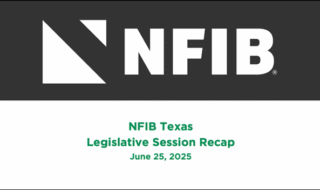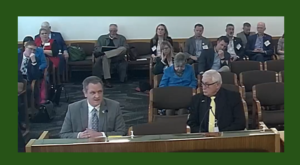March 8, 2025
Busy week of lobbying included committee appearances against measures promoting more lawsuits
State Director Anthony Smith reports from Salem on the small business agenda
March 7 was Day 46 of the 160-day 2025 Oregon Legislative Session and that means we’re inching closer and closer each day to the “First Chamber” deadlines. Each bill assigned to a policy committee (rules, revenue, and joint committees are exempt) must be scheduled for a work session (where a committee acts on a bill) by Friday, March 21. Any bill not posted for a work session by this date is officially dead for the remainder of the year.
Policy committees then have another two and a half weeks to amend and vote to advance measures out of committee and to the floor of the bill’s chamber of origin (house bills to the House floor and senate bills to the Senate floor.) Bills that fail to advance by Wednesday, April 9 are also officially dead for the year.
During any legislative session, first and second chamber deadlines are when most bills meet their demise, but with the unusually high number of bills introduced this year, more bills than ever are likely to die by April 9 – so it’s no accident that we’ve scheduled our 2025 NFIB Small Business Day in Salem for Wednesday, Aprill 23 (registration is open!) With the dead bills out of the way, we can focus all our efforts on passing good bills that are still alive and working to defeat bad bills in their second chamber. Looking ahead, the “Second Chamber” deadlines are Friday, May 9 for posting and Friday, May 23 to move out of committee.
Here’s what’s been happening in the Oregon Capitol and what’s coming up:
UI Benefits for Striking Workers Heading to Senate Floor
On March 6, the Senate Labor and Business Committee voted 3-2 along party lines to advance SB 916 to the senate floor. Since our last update, the bill received several additional informational and public hearings (with NFIB weighing in a second time, on proposed amendments). In the end, private sector and public sector employers remained opposed and labor unions (public and private) were in support.
This bill is quickly shaping up to be the first major partisan fight of the 2025 session. Republicans seem to be firmly opposed to the measure, but it remains to be seen whether the opposition will be bipartisan, i.e., if any Democrats will cross the aisle and vote against the measure.
As noted in this article from OPB’s Dirk VanderHart, “…while New York and New Jersey are the only states that currently have similar provisions on the books, those states bar public employees from striking. Oregon does not have an across-the-board ban….”
Sen. Daniel Bonham, vice-chair of the committee and Senate Republican Leader, said this about the bill during the work session, “This is just one more of many cuts that will cost small businesses. This will have a negative impact on our school districts. Absolutely it will. There’s no question about it.”
NFIB is asking members to contact their legislators immediately and urge them to vote NO on SB 916!
More Bills, More Potential Lawsuits Against Employers
In our last update, we previewed HB 3187, which seeks to redefine age discrimination in Oregon, even though it’s already illegal under state and federal law. NFIB and other employer groups testified in opposition to the bill during a public hearing on Feb. 19 in the House Committee on Labor and Workplace Standards.
Here’s an excerpt from NFIB’s testimony on the bill:
Here’s the bottom line: we can’t have Oregon statute allowing bona fide factors, such as work experience, to legally justify a pay differential in one area of law and then have another statute saying that it’s discrimination to do that. For employers acting in good faith to follow both the letter of the law and the spirit of the law, we can’t set them up for impossible decisions that result in breaking the law, no matter what decision they make.
Unfortunately, HB 3187 was just the beginning.
In a public hearing on Feb. 26 in the Senate Committee on Judiciary NFIB testified in opposition to SB 426, which would make general construction contractors and property owners liable for the unpaid wages of subcontractors.
Here are some excerpts from NFIB’s testimony on the bill:
The law must be even-handed. The state has an interest in both protecting workers, and those businesses that follow the law…. Making one independent business liable for the unpaid wages of another is a dangerous precedent to set…. SB 426 is not an approach NFIB can support because it fundamentally holds the wrong party responsible for breaking the law.
But wait… there’s more.
NFIB also testified in opposition to HB 2746 during a public hearing in the House Committee on Labor and Workplace Standards on March 3. The bill would require Oregon employers, large and small, to include wage and benefit information in job postings for new hires, promotions, and transfers. It also requires employers to maintain wage and benefit history records for each employee.
Some excerpts from NFIB’s testimony on the bill:
The bill would authorize BOLI to penalize employers up to $10,000 per year for failing to comply with these new disclosure requirements… it creates an unnecessary, potentially costly, and burdensome state mandate on small businesses. There are already significant federal and state standards that explicitly prohibit wage discrimination…. HB 2746 sets up employers, particularly small businesses, for non-compliance.
A Bright Spot – Targeted UI Tax Relief for Small Businesses
HB 2271, chief sponsored by Rep. Boomer Wright, fixes a problem for a limited and targeted number of small businesses that had their unemployment insurance experience ratings frozen at an unusually high rate through no fault of their own after the Oregon Legislature passed HB 3389 in 2021.
HB 3389 saved Oregon employers billions in automatic tax increases, providing short-term and long-term relief for employers facing increased UI taxes through no fault of their own. A key feature of the bill was that it froze experience ratings for three years. For most businesses, that was a benefit. But for businesses whose experience rating would have decreased during the freeze period, they were locked in to artificially high tax rates for up to three years.
HB 2271 attempts to correct this unintended consequence by doing no additional harm to the broader business community. Importantly, the bill will not trigger higher UI taxes for Oregon employers, but it will help about 1,000 Oregon small businesses save about $3.6 million over the next three years.
Only businesses whose UI tax rate would have dropped by 2.5 percentage points if/when unfrozen would be eligible to receive a credit against future UI payroll taxes, up to $5,000 per year for three years.
NFIB testified on HB 2271 during a public hearing in the House Committee on Revenue on March 4. NFIB’s comments in support start at the 12-minute mark of the video here.
Past Legislative Reports
— February 14: Bad Age-Discrimination Bill Resurfaces. Flurry of Activity on Estate Tax
— February 1: Oregon Legislators Begin Work on 2,500 Bills
NFIB is a member-driven organization advocating on behalf of small and independent businesses nationwide.
Related Articles















